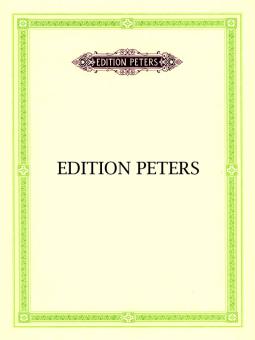César Franck
Panis Angelicus
for Voice and Piano
César Franck
Panis Angelicus
for Voice and Piano
- Compositor César Franck
- Editorial Edition Peters
- Nº de pedido EP71799
plazo de entrega 1-3 días laborables
IVA incluido.,
Más gastos de envío
No disponible en todos los países. Leer más
Descripción de la:
Includes versions for High, Medium or Low Voice(G, F and E flat)
The words for Panis angelicus are from a longer hymn text, Sacris Solemnis , written by St Thomas Aquinas in the thirteenth century for the newly established Feast of Corpus Christi, and would originally have been sung to a plainchant. César Franck set this verse of seven lines in 1872. His deep religious feelings fashioned a memorable melody, one which is within the scope of all singers - its range is only a seventh and, if you follow the word patterns, the breathing sits comfortably. It is, in its way, simple and direct, but with the chance to use the voice to its full. The Latin words are not hard to sing, but if you prefer to perform it in English, the translation conveys the essential meaning. Franck originally wrote Panis angelicus for tenor, cello, harp, organ and double bass, but it slips easily into the keyboard arrangement. The colours of the original scoring are evident - the organ's sustained chords, the semi-staccato notes for the harp and the cello's countermelody beginning in bar 38 (which could be transferred to another melodic instrument if that suits the occasion). Some discreet repetition of the long tied notes and doubling of the bass at the octave can give the piano more resonance. The accompaniment probably works best with a minimum pedalling and an organist's style of fingering. The dynamics ask for a triumphant final statement of the words 'pauper, servus” in bar 53. It makes complete musical sense to make a diminuendo for the word 'humilis” in bar 56, leading to a thoughtful postlude.
Gordon Stewart
The words for Panis angelicus are from a longer hymn text, Sacris Solemnis , written by St Thomas Aquinas in the thirteenth century for the newly established Feast of Corpus Christi, and would originally have been sung to a plainchant. César Franck set this verse of seven lines in 1872. His deep religious feelings fashioned a memorable melody, one which is within the scope of all singers - its range is only a seventh and, if you follow the word patterns, the breathing sits comfortably. It is, in its way, simple and direct, but with the chance to use the voice to its full. The Latin words are not hard to sing, but if you prefer to perform it in English, the translation conveys the essential meaning. Franck originally wrote Panis angelicus for tenor, cello, harp, organ and double bass, but it slips easily into the keyboard arrangement. The colours of the original scoring are evident - the organ's sustained chords, the semi-staccato notes for the harp and the cello's countermelody beginning in bar 38 (which could be transferred to another melodic instrument if that suits the occasion). Some discreet repetition of the long tied notes and doubling of the bass at the octave can give the piano more resonance. The accompaniment probably works best with a minimum pedalling and an organist's style of fingering. The dynamics ask for a triumphant final statement of the words 'pauper, servus” in bar 53. It makes complete musical sense to make a diminuendo for the word 'humilis” in bar 56, leading to a thoughtful postlude.
Gordon Stewart

